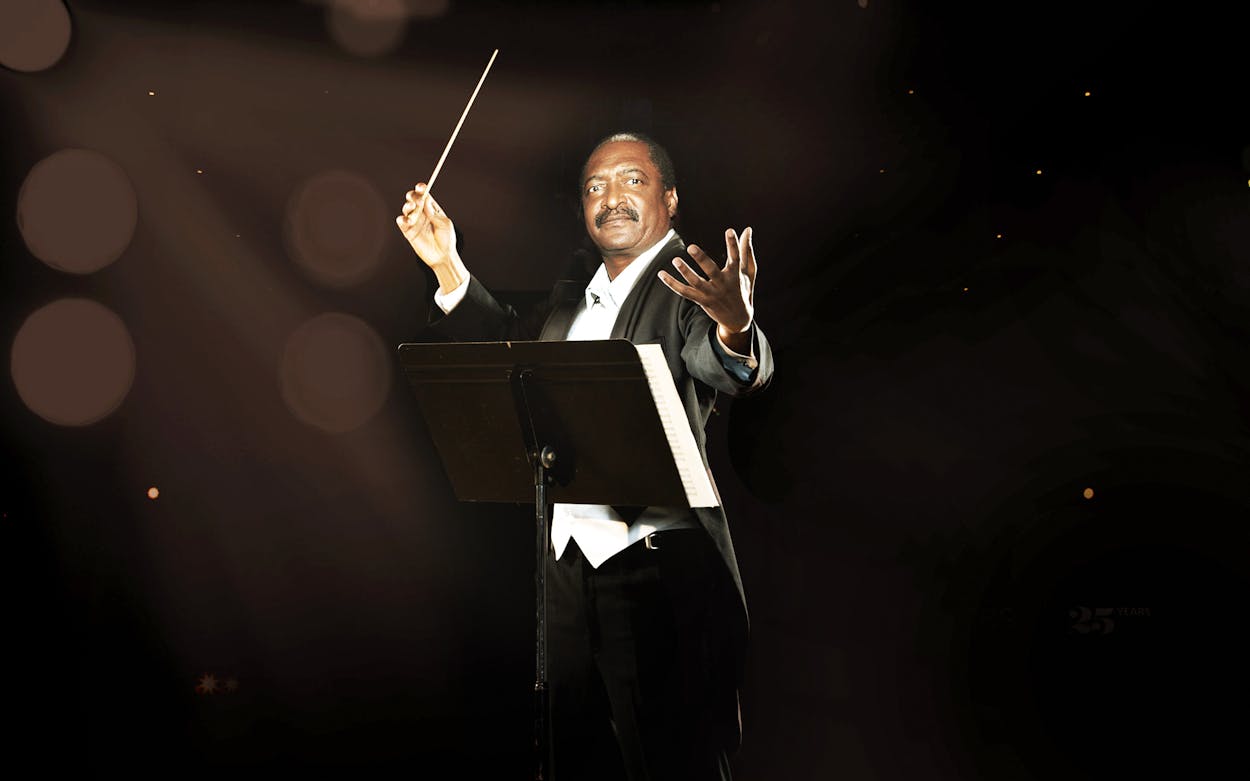Earlier this month, Mathew Knowles posted a clip on Instagram of a scene from Project Popstar, a contest run in the early 2000s by his company, Music World Entertainment. The talent search aimed to identify the next iteration of Destiny’s Child—the superstar girl group that Knowles managed and that included his daughter Beyoncé—among a vast crowd of Houston’s homegrown talent.
In the grainy scene, which unfolds in a mirrored dance studio, Knowles, wearing a baggy dress shirt and jeans, commands each of his teenage-ish contestants to publicly eliminate three people from the burgeoning girl group—right there, on the spot, while their bandmates look on. Though the gladiatorial, kill-or-be-killed clip puts me on edge, Knowles seems exceptionally relaxed amid the rising tension; more mid-level manager leading a sales meeting than callous crusher of dreams. “There’s somebody in here you don’t like at all,” he reasons with one nervous contestant who hesitates to guillotine her competitors, his voice almost chillingly comforting. “There’s somebody in here, you hate their guts, I can tell by your reaction.”
Forcing contestants to turn on one another, stripping away the niceties that keep conflict at bay, was already a sluggish reality television trope when Knowles invoked it way back in 2004. But after an hour on the phone with the legendary 68-year-old music mogul, who still bristles with much of the intensity that made him one of the most successful managers in the history of music, I’m no longer certain his pot-stirring was ever a ploy to begin with.
Last week, the University of Houston announced that Knowles—who is credited with building Destiny’s Child from scratch and launching the solo career of a megastar who is the closest thing America has to real-life royalty—will begin teaching an online master class titled “The Music Industry and the Digital Age.” Anyone can fork over $3,000 to take the class (it’s $1,000 for UH students and alumni), in which the straight-talking Knowles, who lives in both Houston and Southern California, will share his “‘secret sauce’ for success” with the masses. The fifteen-week class, a collaboration with the Kathrine G. McGovern College of the Arts and the C.T. Bauer College of Business, offers Knowles, an engaging speaker who seems to delight in wide-ranging, extemporaneous discussions, the sort of freedom he craves. It will also allow him any number of opportunities to teach students a lesson that seems to be at the core of his interactions with music industry outsiders, whether they’re sitting in a college classroom or trying to make the cut on a reality TV show: “This is the music industry, and we don’t have time to care about your feelings,” he said over the phone last week, adding that emotions, combined with ego, are what ruins careers, a theme he’s touched upon in other interviews. “We only care if you’re passionate and you know what you’re talking about.”
Knowles, always ambitious and strategic and with more than a hint of ego on regular display, had a successful career in medical equipment sales before quitting to launch a music company and manage Girls Tyme, the teenybopper group that would eventually become Destiny’s Child. Even when he was dealing with little girls, the hard-driving manager was known for his blunt speech and drill-sergeant-like demeanor, some of which is captured in audition footage for the group in the early nineties. “We would try not to let it break us,” LaTavia Roberson, an original member of Destiny’s Child, told the Mirror in 2011, referring to her former manager’s belittling behavior.
Years later, on the 2016 song “Daddy Lessons,” Beyoncé seemed to still be wrestling with her father’s demanding personality and the success it unleashed, noting that her father “made a soldier” out of her. “My daddy said shoot, oh my daddy said shoot,” she croons on the song’s chorus.
In recent years, Mathew Knowles has resurrected his drill sergeant demeanor, using it to market himself as someone who can turn almost anyone into a music business soldier. His 2015 book, The DNA of Achievers: 10 Traits of Highly Successful Professionals, offers readers chapters on team-building, work ethic, and an equation for success he refers to as the “talk-to-do ratio.” He’s also lured music industry aspirants to daylong seminars in downtown Houston, where you can spend $320 to hear Knowles unpack the ingredients of success—as well undergo the sort of brutalizing critiques that he’s known for, even when they involve telling people to fix bad haircuts or lose weight. “‘You’re asking like a kid!’ he bellows at one eighteen-year-old woman who wants to know how she can work on her stage presence,” the Guardian reported after one of their journalists attended a Knowles seminar. “‘Shy … meek … that is not this industry.’”
Knowles has already taught classes at Texas Southern University and Prairie View A&M. He says his master class will dive into everything from the history of music in America to the importance of entrepreneurship and the impact of social media on the industry. The class will also include guest appearances from record label executives and songwriters, though Knowles declined to reveal their names or whether they’ll include certain members of his family.
As for his “secret sauce,” you can’t help but wonder if the ingredients are not so secret. Perhaps the real value of the class is seeing whether you can survive the straight-talking ferocity of Mathew Knowles, the man who makes people with bad haircuts wince and turns little girls into soldiers who change the world. Assuming you can, I’m willing to bet you’re destined for some kind of success, musically or otherwise.
“This is not a class where the goal is to be average,” Knowles tells me toward the end of our conversation, his stern voice making me feel like I just messed up a dance routine in his Houston backyard circa 1992. “This is a class in which the goal is to be exceptional!”








